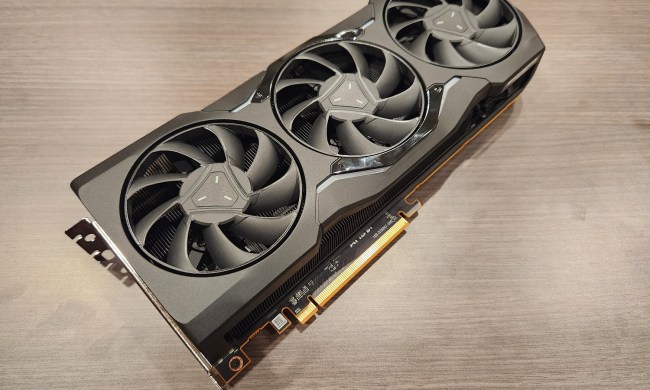
After the US Federal Trade Commission (FTC) and European Union Commission began responding to complaints surrounding the anti-competitive nature of Nvidia’s GeForce Partner Program (GPP), rival graphics chip-maker AMD has released its own statement on the matter. “Our proud pastime of PC gaming has been built on the idea of freedom,” Scott Herkelman, AMD Radeon Technologies Group vice president and general manager, wrote in an open letter, highlighting the company’s commitment to open innovation, transparency, partnerships, and goal in expanding the PC gaming ecosystem.
“We pledge to put premium, high-performance graphics cards in the hands of as many gamers as possible and give our partners the support they need without anti-competitive conditions,” Herkelman continued. “We believe that freedom of choice in PC gaming isn’t a privilege. It’s a right.” After partner Asus announced its AREZ-branded Radeon RX graphics board today, AMD said that in the coming weeks, its add-in board partners [will] launch new brands that carry an AMD Radeon product.” Though Nvidia wasn’t mentioned anywhere by name, in a jab at his competitor, Herkelman noted that with these partnerships come with “no anti-gamer [or] anti-competitive.”
Nvidia’s GeForce Partner Program originally came under fire as a result of a HardOCP report suggesting that the company was encouraging its graphics card partners to not sell AMD products as part of their gaming brands, in order to get a preferential supply of GPUs. It’s been reported that MSI and Gigabyte dropped AMD cards from their lineup to fulfill GPP obligations. It’s also been reported that PC-makers Dell and HP refused to join Nvidia’s program over the restrictions, and most recently, the FTC and EU Commission began responding to individual user complaints, with users acknowledging on Reddit that they have received either a voicemail or email response from the regulatory bodies.
As WCCFTech reports, this could be an indication that both the FTC and EU Commission will begin looking into the partner program as a possible case of anti-competitive behavior.
Although no official announcement has been made from any regulatory body, and any claims of anti-competitive behavior from Nvidia are entirely alleged and provided by anonymous sources, the evidence has been mounting. The original HardOCP report on the matter is the most damning, but other sites have also been doing their research and have uncovered some similar evidence of their own.
Considering the still-ongoing pricing and availability issues of many graphics cards, that issue is of even more importance for graphics card partner companies at the moment. If true, it would also do consumers no favors at all, as it would mean a concentration of supply in fewer hands, thereby potentially allowing for even greater pricing control by a few manufacturers and retail partners.
Even if the FTC EU do look into this matter, however, any response is unlikely to be swift. Unless Nvidia were to voluntarily take steps to change its alleged practices, any investigation in an official capacity would take quite some time to come to fruition.
Updated on 04/17/2018 with AMD’s response.




